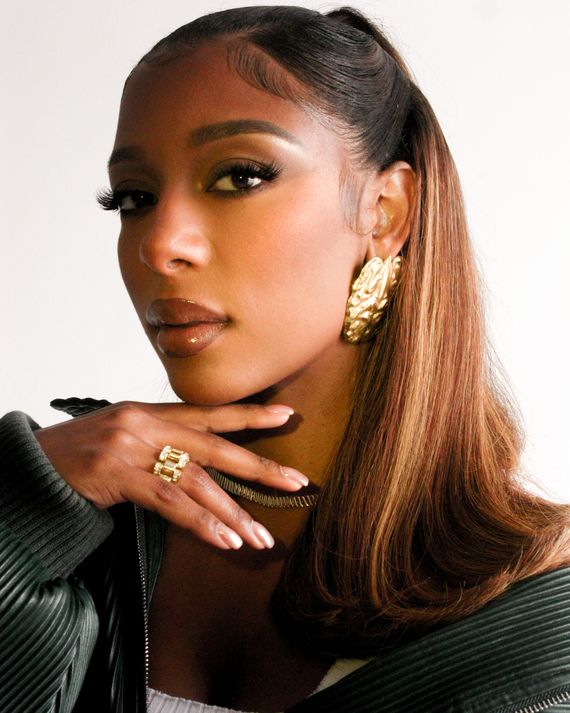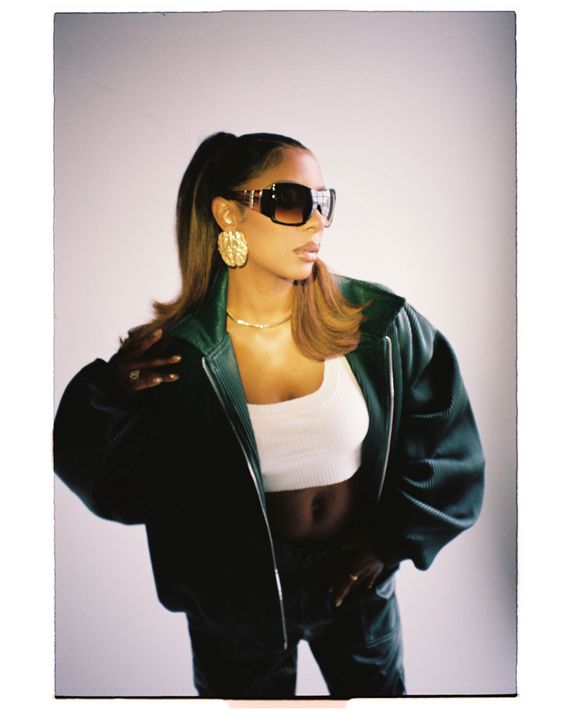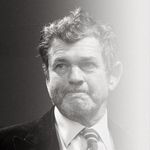
Victoria Monét starts with the show tunes.
“Judy Garland was one of the first singers I saw on film,” she tells me, picking up an old copy of The Wizard of Oz’s soundtrack. “‘Over the Rainbow’ connects with me a lot.”
Cosmic Vinyl, an unassuming record store on Sunset Boulevard lined with ‘70s-style wood paneling, is a fitting spot to find Monét, an artist known for melding older eras of music with more modern sounds. On her just-released album Jaguar II, she again pays respect to her predecessors. Lead single “Smoke” with Lucky Daye is a smooth throwback to ‘70s funk; “Party Girls,” with Buju Banton, blends dancehall riddims with the sultry nightlife R&B anthems of the ‘90s; and the Earth, Wind, and Fire-indebted “Hollywood” features the actual legendary soul group on vocals. “I combine lineages,” she says.
Though Jaguar II has received its share of fanfare and press coverage, for years Monét operated behind the scenes. Born in Atlanta and raised in Sacramento, she moved to Los Angeles at the age of 20 with dreams of breaking out as a singer. After a series of false starts and music industry red tape, she was forced to support herself by penning hits for Chloe x Halle, Chris Brown, Jhene Aiko, Fifth Harmony, Brandy, and, most famously, Ariana Grande. Monét spent what time she could on her own work, releasing four moody, genre-hopping EPs between 2014-18. But they received little notice outside of her small but devoted fanbase. It wasn’t until her 2020 EP Jaguar when whispers about her talent began to amplify. The project landed on several year-end critics’ lists and introduced her work to a broader audience. Yet it still didn’t turn her into the true household name her or her fans had thought it would. The hope is Jaguar II finally will.
“I don’t necessarily have regrets,” says Monét, of the years she spent writing for other pop stars and waiting patiently for her turn in the spotlight. “As much as I was ready the first year I moved to L.A. to be an artist, it wasn’t the time. It’s just part of my story. Everything that I was doing was necessary.”
Your EP Jaguar, which you released in the summer of 2020, was your most successful project to date. But it still didn’t seem to hit the heights your fans have always wanted for you, and you’re frequently referred to as underrated. Does that label ever bother you?
Jaguar I did a lot for me, though I was scared about the timing of it: Did it seem insensitive to be celebratory and sing songs like “Experience” and “Dive” and not be talking about what’s going on with Black people in America and the world in a crisis? But people were appreciative of it because it distracted them and gave them hope; it became something good that happened in 2020. So I’m thankful for the fans who have been here along the way. I just feel like I have so much more road to cover. And I would rather be underrated than overrated. But I also appreciate the underrated comments because it means people see more for me than I already have. It’s like they’re manifesting things for me on their own. I want them to see me get what they believe I deserve.
We’re in an era of fast career ascents. Artist development now feels like a lost art. You spent years writing songs for other musicians before breaking out on your own. How have you navigated prioritizing your solo career over songwriting? What has that process been like for you?When I was putting out my first EPs, I didn’t have a team and I didn’t have a manager. Like, it was just me. When I went on tour, it was me doing my hair and makeup, managing myself, paying everybody — I had a sound guy and videographer and was paying for their stay. It was just a lot for me to handle. I feel like I’ve worked in everyone’s position that I’ve hired on the team; they’re mostly women. I have really big respect for what everybody does because I understand it. And being able to delegate has freed up so much more space to actually be creative with music and the stuff I’m supposed to be focused on.
You recorded songs from both Jaguar I and II simultaneously, with the producer D’Mile. What have the elements of Jaguar II specifically — the soul-driven music, the Y2K aesthetics of your videos and photo shoots — represented to you now that it’s finished?
I feel like I’ve discovered so much about myself in this process, even subconsciously — what my aesthetic is, what colors make me comfortable, what type of people I want to be around me, what type of music really inspires me. I’m not necessarily trying to go into the studio and say, “Today I’m going to make a hit song.” It was kind of like doing shadow work and digging deeper into who I am as a person. It’s also been a life-changing time for me — having a child and starting her at the beginning, playing her R&B because my mom always played the Temptations. It’s been a full-circle moment.
This is the first time you’ve released an album as a mother. How has that been?
It’s really been a sacrifice, because every time I was working on it, I was away from my daughter, which made me feel like when I was with her everything shut off. I’m really not trying to multitask. I wanted to teach her things. I know that when she grows up she’ll appreciate this, because I wanted to provide a life for her that was different from mine and different from my mom’s. I just wanted to create a world where she has to hear less “no’s.” If she wants to go to Europe, it’s like, okay, let’s go! I’m also still pursuing what I dreamed of before she existed. I’m showing her it doesn’t matter what comes into your life, if you have something that you want to do and you believe in it, you make the sacrifices.
Has motherhood changed any of the themes you feel inspired to write about?
Mostly it changes the music I listen to. Right now, it’s a lot of “Baby Shark” and Cocomelon. But I’m also trying to absorb it. Like, kids love this, it’s very catchy — is it because it’s simple or the tone they’re singing it in? I’m trying to pick that up to bring into R&B and pop music. But I’m also trying to expose her to music with depth, like Earth, Wind & Fire — and mine. She loves to sing “Smoke.” She’s my little A&R; she’s got her tastes.
Both your daughter and your mom cameo in the “On My Mama” music video. What was it like getting your mom to dance on camera?
I asked her to be in it, and she was like, “Me?” And I’m like, “Yes, of course, you’re my mom. I get it from you! I’m singing the song about you! Be in the video.” I sat her in my glam chair so my team could spoil her and get her hair and makeup and nails done. Then she got on set and was like, “So, what do you need? I don’t know what to do.” I was like, “Just be you, just dance!” And so as soon as the music comes on, she snaps. I’m like, wait, this shy person who was just asking you what to do just went for it?! She was living her best life. I was like, “Oh, you were waiting for this moment.” The dancers were hyping her up too.
The video also doubles as a beautiful homage to the South and many of the artists we grew up watching, including a cameo from Chalie Boy, who you sample on the song. Why was it important for you to give a nod to regional southern culture?
My family is from the South. In addition to being from Sacramento, I was taking family trips to Mobile, Alabama, and we would go to Mardi Gras there and see the horn players dancing down the streets and the celebration of Black culture. It seemed like something that we owned. In school, I was learning about the way America was built and all of the ways that Black people were taken advantage of and treated. But when I would see those vignettes of celebration, I was like, “Oh, wow, we’ve made something out of nothing. We own these things, and that’s something people can never take away from us.” I just feel like it’s important to highlight the really great part of what we do; we’re able to laugh hysterically and smile and celebrate and commune with each other and create really amazing memories of Black people. The South in the early 2000s was one of those moments where we were inescapable; we were everywhere. The dances that we’re doing in the video crossed from our culture to other cultures. So for “On My Mama,” it feels very triumphant and it feels very Black. The video could easily have been a sexier, futuristic direction, but it feels so much more impactful to remind ourselves of the past. Planning the video was so fun too, being like, Oh, do you remember those belts that used to light up and say things across them? Do you remember Girbaud jeans, the durags, the way people used to wear their hats and leave the stickers on them, the tall tees? All of these memories really make you smile. So we wanted to capture that.
You mentioned playing Earth, Wind & Fire for your daughter. They’re also featured on the new album, along with Lucky Daye, Buju Banton, and Kaytranada. Each artist represents very different styles, generations, and regional sounds. How did you decide to include all of them?
I started Jaguar I by listening to Earth, Wind & Fire, studying their music, kind of basing my whole sound on their sound and trying to take elements that I loved. When the opportunity came to have them feature, it felt like another full-circle thing. That was the universe and God working in my favor. To have their blessing on my music just means that they admire it as well. There’s a mutual respect there. And during my childhood, my mom listened to Buju a lot. I always remembered his voice; I remember asking her, like, “Who’s this person?” And I kept hearing my song “Party Girls” with this reggae, dancehall-type energy, so it just jumped at me that it should be him on it. When we were doing the track list, before I even had the feature, I wrote “Party Girls featuring Buju.” And then I reached out to him over Instagram and he said “yes.” I manifested it.
Tell me about the song “Cadillac (A Pimp’s Anthem),” which showcases women in a role traditionally reserved for men. Where did your interest in subverting gender roles come from?
I feel like it’s always been there for me. Even since high school, I was kind of not your typical girl, cheerleading and wearing skirts to school. I was in sweatpants and wore no makeup. I think it’s just cool to flip people’s minds a bit on what they think a quote-unquote pimp is or what it is to be a player … because the same conversations guys have, I feel like girls have. We have options too.
That reminds me of a lyric on “Alright,” your song with Kaytranada, where you talk about going out to find someone new and not calling your old guy back.
Right! We hear this more so in rap, maybe not R&B as much, when male rappers talk “big dick energy.” I’m like, why can’t girls have “big pussy energy”? They really own the fact that they’re not tied down by traditional standards and stereotypes. We’re all humans; maybe we’re not monogamous.
You also said Earth, Wind & Fire’s music was an inspiration while making the first Jaguar. How do you approach synthesizing older music and those influences into your work without it being derivative or stolen in any way?
Music is such a magical thing. It’s crazy that you can write so many different songs with 12 notes. I think our nature as creatives is to be inspired by what came before us and acknowledge and respect it, but do it in your way. And if it’s something that we actually want to take from an original, my team and I are very good at going in and getting it cleared. Everyone who we’ve ever used anything from is also being paid for it. Shout-out to all the creatives doing this, because it’s not easy with millions of songs being made today by people across the world to try to create something that is original and only yours.
Even when artists are careful, it doesn’t always work. As you know, there have been a number of lawsuits brought against songwriters over the years for copyright infringement. How do you approach that as a writer?
It can be scary, but there are ways that you can check before you put stuff out. There are people who specialize in listening to it, who will say, like, “You might want to get this cleared.” So that’s part of the business side of it. On “7 Rings,” they took 90 percent of that song. But it also just went diamond. So without that melody I don’t know if it would have been as catchy. It’s a catch-22. The problem comes when someone hears something that is in afterward, because I’m sure Ed Sheeran got his song checked before he put it out. But someone heard something differently and they basically wasted his time trying to make it make sense in a court of law.
Are you still writing songs for other people?
I am, but not as often. I haven’t had the time — being an artist who writes their music and is super-involved in everything creatively and is not just letting the team do things on my behalf leaves very little time to do much else. Any other free time I have is allotted to my family. I think there will be a season where I do have the time, probably after the success of this album and this tour and writing my next album; then I would be more open to spending more time with songwriting. I feel like it has to be a project I’m passionate about. I have so many people who I want to collaborate with: Beyoncé, Janet, Sadé. I think I want to eventually genre-switch. I’d love to jump into country or pop-rock, just to challenge myself and see what it’s like. I love songwriting so much, but writers in general aren’t really respected the way they should be. So it was hard for me to stay in love completely. And also because I love the stage so much and I love to sing, I kinda wanted to explore that and add to my narrative, to pursue the dream that I’ve always had. As a kid I didn’t see writing as my career; I didn’t even know that people didn’t write their own songs. I’m having fun being hands on and being able to see it all the way through. As a songwriter, you kind of stop at the studio.
Ariana Grande is one of your best friends and main collaborators. Has she given any advice over the years on navigating the solo journey you’re on?
I think all of my friends are super-supportive. We haven’t specifically sat down and had a question-and-answer session about advice. I think the best way that I learned was through experience. I was a person who didn’t go to college. I just jumped into the field. I think that’s how I learned the best: just going into it and navigating it in real time. I learned the most from my own mistakes, not to take certain things personally or learning what’s actually owed or what the right thing is to do.
How did you stay patient over the years, knowing you were destined for something greater than where you were?
It’s really not easy. There are times when I question, but I can’t really stop, because it’s what I love to do. If I had an office job and was just working for a promotion and that promotion didn’t come, I think it would be easier to just walk away. And I’m so close, I might as well just keep going. I also have great people around me holding me up and keeping me excited to do better things. I’m in competition with my old self, and that makes me keep experimenting.
Your first solo headlining tour is starting up this fall. Touring is especially tricky for artists right now, even the successful ones. Fans are throwing things onstage; artists themselves aren’t making nearly as much money as they used to on the road. How are you approaching it all?
Well, I’m a little bit scared to tour even though I don’t believe that my fans are that way … I don’t know what it stems from, why people are throwing things. I don’t know if they’re just that excited or they’re trying to get another level of attention from the artists. I don’t want anything to hit my face or anybody else’s face. I want to be safe. So I’m like, do I need to put a net between me and the audience or a clear screen or something? How are artists meant to protect themselves from these situations? Because it’s not like security is not there; even an artist in an arena like Drake is getting things thrown onstage.
But beyond that, I’m really excited. It’s definitely an investment for me too. I’m not at the place where I earn money from touring yet. It’s something that I have to invest in myself, but I happily do it because it’s something that I love to do, and I know that I believe in myself enough to know that there’s going to be a return eventually. For rehearsals, everything has been really, really amazing and challenging at the same time. I think it’s the busiest time of my life. So simultaneously promoting an album while rehearsing, you have to divide your brain a bit into multiple categories to execute it correctly. It probably would’ve been easier if these were two separate entities, like an album and then months and months later a tour. But they’re happening at the same time. It’s a good challenge, but it definitely is a challenge.
I appreciate you saying that. I think there’s a big misconception around stardom being super financially comfortable.
I feel like I potentially could be minimally profitable if I didn’t like to tour the way I like to tour, but I want to bring the band, I want to bring dancers, just making sure I give people the show that I envision. Maybe if it were just a microphone and a DJ, then yes, but I have to cover a lot of costs for staff and travel and equipment. I just want my fans to get the best experience and not give them any less than they deserve. So I’m spending money on them.
How are you defining success for yourself now? Does Jaguar II feel like a turning point in your career for you into the mainstream?
I think what’s defining success for me now is happiness. I’ve learned over the years that even when you get to certain goals of yours, by the time you get there, you’ll have other ones. So it’s almost like you’re never present. I feel like whenever we stress and have anxiety, it comes from either analyzing the past or trying to predict the future. But if you’re present, you can just really evaluate how you actually feel by just staying in the moment. Like, okay, how do you feel today? Do you feel happy? Are you wanting to readjust anything in this moment? But also I’m doing everything I can to support the art because it’s not only about me, it’s about all of my collaborators and everyone else who poured time into the music. I want it to be as successful as it can be for them, for my family, but to also remain present. It’s this balancing act of business mind and then zen spiritual mind. But I’m feeling good. I think that everything is happening the way it’s supposed to.





